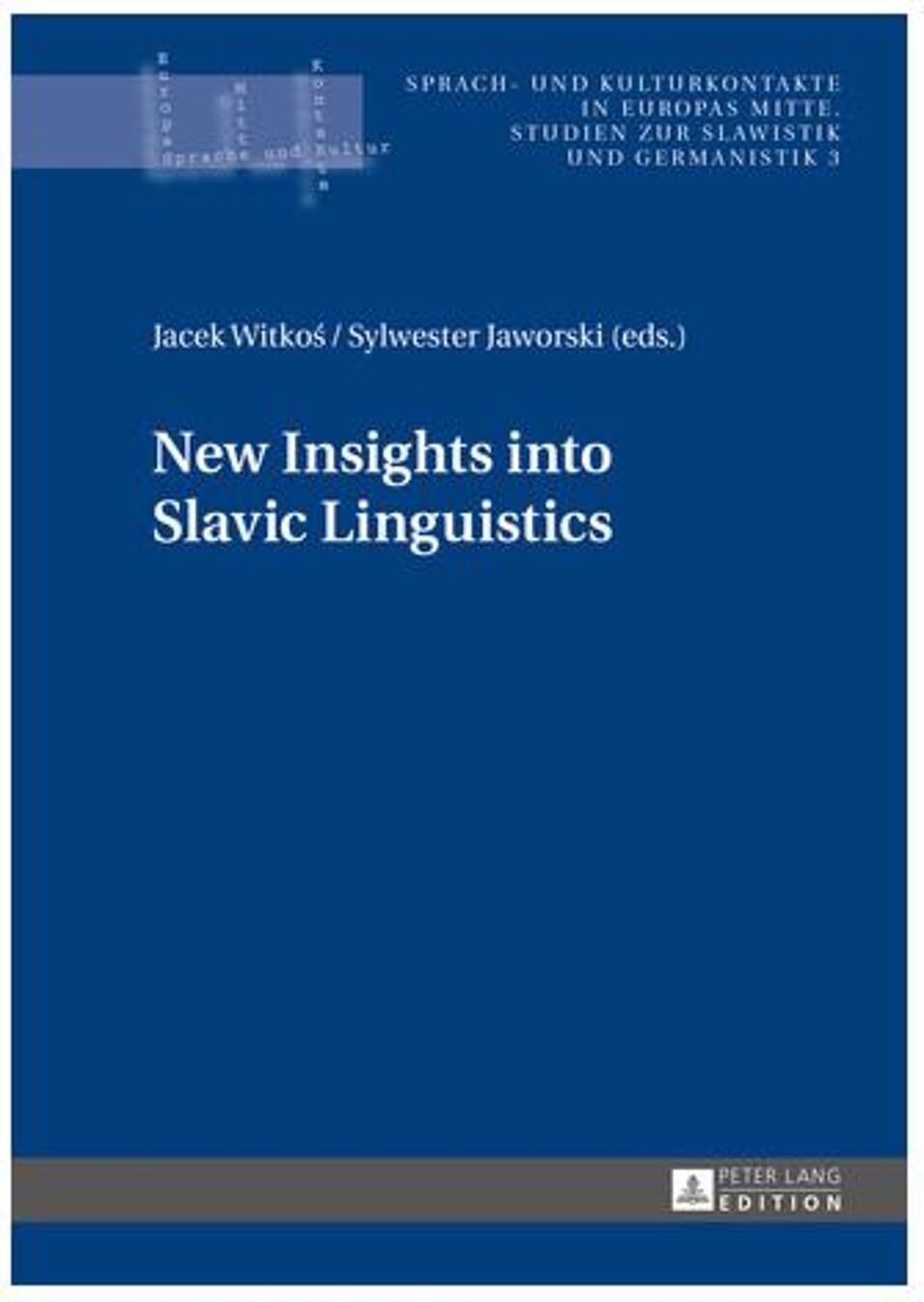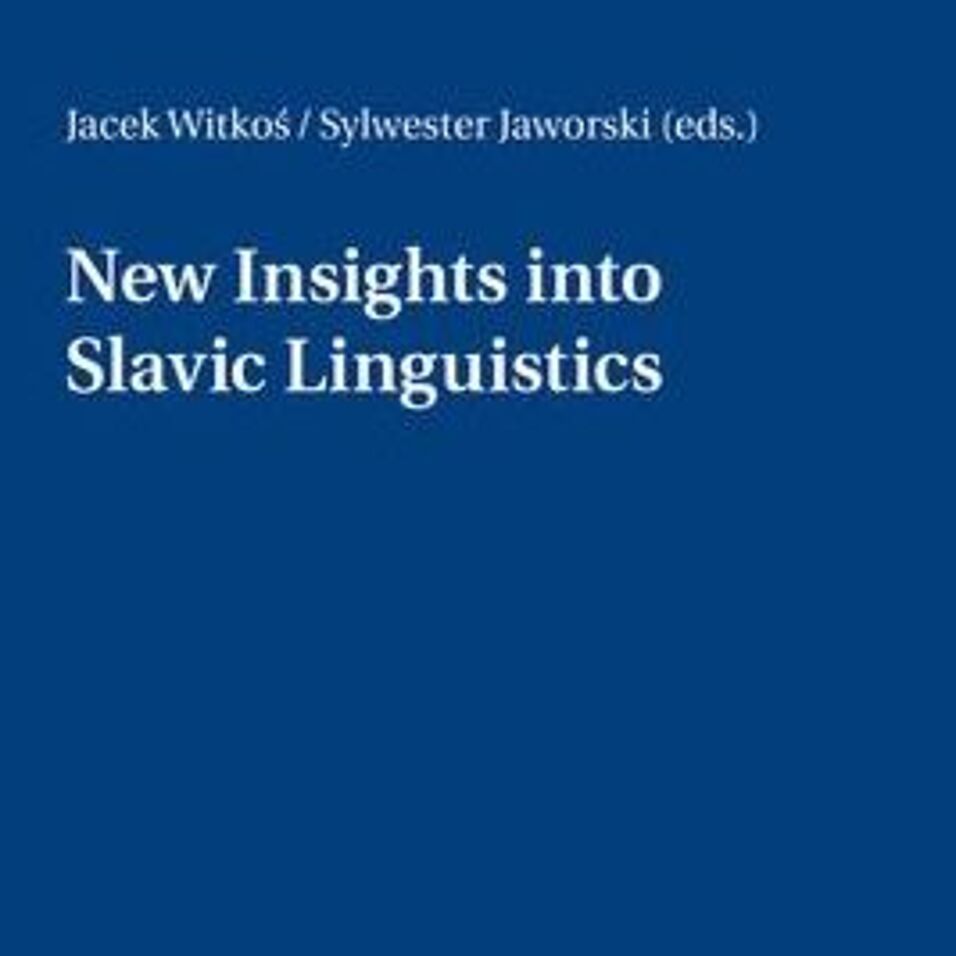Witkoś, Jacek / Jaworski, Sylwester (eds.): New Insights into Slavic Linguistics (= Sprach- und Kulturkontakte in Europas Mitte, Band 3). Frankfurt am Main, Berlin, Bern, Bruxelles, New York, Oxford, Wien, 2014. 406 pp., 6 col. fig., 43 tables, 228 graphs.
ISBN 978-3-631-64731-8 hb. (Hardcover).
ISBN 978-3-653-04359-4 (eBook)
Orders:
https://www.peterlang.com/view/title/16682
About the book:
This volume presents a number of contributions to the 2013 Annual Meeting of the Slavic Linguistics Society held in Szczecin, Poland, October 26-28. The largest number of articles address issues related to the (morpho)syntactic level of language structure, and several papers describe results of recent research into different aspects of Slavic linguistics as well. The current volume proves conclusively that Slavic linguists make a remarkable contribution to the development of various theoretical frameworks by analysing linguistic evidence from richly inflected languages, which allows them to test and modify contemporary theories and approaches based on other types of data.
About this volume's editors:
Jacek Witkoś is professor of English linguistics at Adam Mickiewicz University (Poland). His research interests include general linguistics, theory of syntax, minimalism and Polish-English contrastive syntax. His publication record includes over sixty papers and volumes in the field.
Sylwester Jaworski is assistant professor at Szczecin University (Poland). His research interests focus on phonetics and phonology. So far he has published over twenty papers on connected speech processes and rhotic sounds of various languages.
Contents:
Aleš Bičan
On the Czech Nuclear /r/ and /l/
Anna Bondaruk
Clausal Subjects in Polish Predicational Clauses with Nominal Predicates
Krzysztof Borowski
Condemned to Extinction: Molise Slavic 100 Years Ago and Now
Maria Brenda
English Spatial Prepositions over and above and their Polish Equivalents
Steven Franks
Cased PRO: From GB to Minimalism and Back Again
Steven Franks/Jana Willer-Gold
Agreement Strategies with Conjoined Subjects in Croatian
Zuzanna Fuchs
Gender and Analogical Extension: From Animacy to Borrowings in Polish
Edward Gillian
Differences in Encoding Motion in English and Polish: Difficulties in Translating Motion between these Two Languages
Alina Israeli
Dative-Infinitive БЫ Constructions in Russian. Taxonomy and Semantics
Katarzyna Janic
A Rare Type of Reflexive Use in Slavonic Languages
Sylwester Jaworski
A Comparison of Croatian Syllabic [r] and Polish Obstruentised [r]
Ewa Komorowska
The Structure of the Speech Act of Complimenting Viewed from a Pragmalinguistic Perspective
Peter Kosta/Diego Gabriel Krivochen
Inner Islands and Negation: The Case of Which-Clauses and As-clauses Revisited
Agnieszka Krzanowska
Nationality in Polish and Russian Advertising Slogans
Sylvia Liseling-Nilsson
The Emotionality of Interpersonal Communication and the Translation of the Verbs of Speech
Grant H. Lundberg
Dialect Leveling and Local Identity in Slovenia
Anna Malicka-Kleparska
Polish Anticausative Morpho-Syntax: A Case for a Root-Based Model against Lexicalist Reflexivization
Ewelina Mokrosz
Exhaustive to in Polish: A Minimalist Account
Alla Nedashkivska
Language Practices of Pride and Profit: The Tourist Landscape of L’viv, Ukraine
Veronika Richtarčíková
Epistemic Indefinites in Slovak: Corpus Survey and the Haspelmath Map
Catherine Rudin
Sorting out -to and što: Bulgarian and Macedonian Relative Markers
Olga Rudolf
A Corpus-Based Study of Human Impersonal Constructions in Russian
Jacopo Saturno
Case-Ending Processing in Initial Polish L2: The Role of Frequency, Word Order and Lexical Transparency
Danuta Stanulewicz
The Polish and Kashubian Colour Lexicons: Basic and Non-Basic Terms
Olga Steriopolo
The Distinct Types (Heads vs. Non-Heads) of Homophonous Suffixes: A Case Study of Russian
Anton Zimmerling
Clitic Templates and Discourse Marker ti in Old Czech


